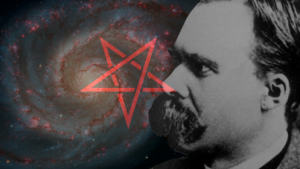Satanism and the Eternal Recurrence

by Thomas LeRoy, Founder of The Sect of the Horned God
“What if some day, or night, a demon were to steal after you into your loneliest loneliness and say to you: “This life as you now live it and have lived it, you will have to live once more and innumerable times more; and there will be nothing new in it, but every pain and every joy and every thought and sigh and everything unutterably small or great in your life will have to return to you, all in the same succession and sequence – even this spider and this moonlight between the trees, and even this moment and I myself. The eternal hourglass of existence is turned upside down again and again, and you with it, speck of dust!
“Would you not throw yourself down and gnash your teeth and curse the demon who spoke thus? Or have you once experienced a tremendous moment when you would have answered him: “You are a god and never have I heard anything more divine.”
–from Nietzsche’s “The Gay Science”
Nietzsche asked this question of his readers back in the 19th century, and now, in the 21st, how would you answer? Does it fill you with dread, or are you pleased with the idea? Is it a blessing or a curse? The demon’s assertion is the frightening possibility that everything that has happened, or will happen, has already occurred and will occur infinitely many more times, without the slightest alteration in detail, living this same life over and over until the end of time. And the image of the demon suggests that such a visitation would be seen as dangerous and unwelcome. Many would be highly unpleased with this notion. Their lives are filled with misery and pain, pain that is, more often than not, self-inflicted. The average Christian, for example, sees pain and suffering as an important part of their existence. Their beliefs hold that we are cursed from birth, and it is our job to live a humble life before the Lord so He may remove that curse, because the here and now is but a transitory phase. Life is simply a preface to an eternity of bliss. Because of this belief, the Christian would find the idea of the eternal recurrence to be horrific. But how would you, the modern Satanist, react to it?
There should be only one answer — with joy!
Satanists, if you are not already living your life to its fullest, then what are you waiting for? Existence itself should be viewed as something to be relished, all the happiness and heartache, pleasure and pain, should be held in the highest regard. You should have a love of fate — amor fati, the affirmation and acceptance of the whole of life. And eternal recurrence is a way to force attention on life exactly as it is. If one could say yes to eternal recurrence, then one could genuinely say yes to life as it is. One way of dealing with this idea, and to achieve a love of fate, according to Nietzsche, was that one must gain freedom from morality — a revaluation of all values:
“To endure the idea of the recurrence one needs: freedom from morality; new means against the fact of pain (pain conceived as a tool, as the father of pleasure; there is no cumulative consciousness of displeasure); the enjoyment of all kinds of uncertainty, experimentalism, as a counterweight to this extreme fatalism; abolition of the concept of necessity; abolition of the ‘will’; abolition of ‘knowledge-in-itself.'”
Nietzsche’s world-view is that of a “Dionysian world of eternally self-creating, eternally self-destroying . . .” The Dionysian attitude toward life is purely artistic, celebrating aesthetic value (even if it has no epistemic value) and rejoicing in the destruction of morality, especially Christian morality. It is an existence always in flux and the counter to the ascetic ideal of self-denial. In this reality the existential truths hold no sway over the individual. Change is the only constant, and with change comes pain. Strength is achieved through this suffering and true joy can come from over-coming (the will to power). Existence is short, and one must craft his or her’s own identity through self-realization and do so without relying on anything transcending that life, such as God or a soul. Your life should be lived without regret, remorse, or guilt, and open to the love of self, others (if found to be worthy of it) and the world in all its manifestations. This view goes beyond nihilism and is the essence of Nietzschean thought.
It is a way of restoring meaning to life — to your life!





